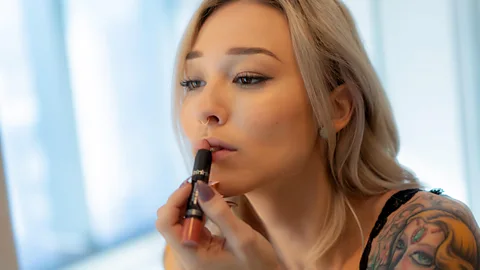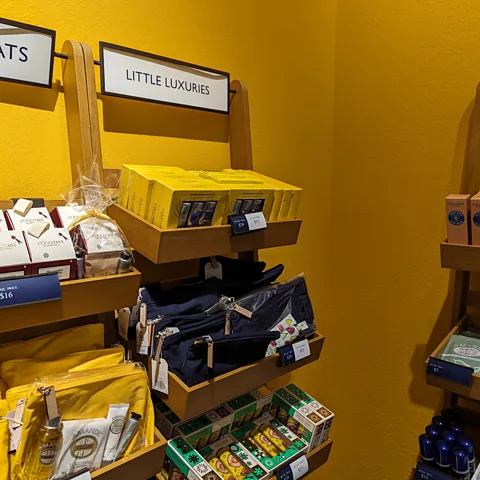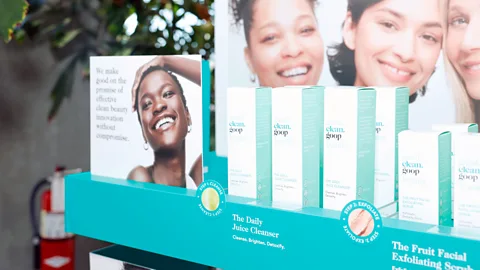By Tatiana Walk-MorrisFeatures correspondent

 Alamy
AlamyConsumers may be easing up on splurge purchases, but they're still buying pick-me-up products that make them feel special, a bit at a time.
If 2023 was the year consumers helped stave off a recession with an unexpected surge in spending, many economists predict 2024 will be the time shoppers finally tighten their belts.
That doesn't mean people will stop spending, say retail analysts. But it will change what they choose to buy. Amid factors including inflation and a slowing job market, global consumers are likely to move away from more high-priced purchases, like electronics, and focus instead on smaller, less expensive treats.
The prolonged economic uncertainty means that consumers are becoming more discriminating about their purchases, says Ethan Chernofsky, senior vice president of marketing at intelligence platform Placer.ai. "There are the things we decide are necessary, and then there's another category of things that aren't necessary but that we consider affordable luxuries," he says.
This desire for these "affordable luxuries" is common in difficult economic times. Some economists refer to the phenomenon as the "lipstick index": a small economic bump led by budget-conscious consumers seeking out relatively affordable splurges, like small cosmetics and perfumes.
Analysts at Deloitte say that the coming year will see consumers spending on little luxuries from the food and beverage sectors, like specialty coffees and snacks as well as premium spirits. Additionally, stressed-out shoppers are prioritising small splurge purchases in the wellness and personal-care sectors. They're buying small "glamour" items like they have in similar circumstances in the past, but they're also increasingly interested in self-care products, such as anti-ageing serums and "clean" skincare.

 Tatiana Walk-Morris
Tatiana Walk-Morris'I want to treat myself a little better'
Given the current economic climate, lower-income consumers have been hit harder than higher-income shoppers. Yet these consumers still desire to treat themselves – within reason, says Karla Martin, who leads Deloitte's Fashion Apparel and Footwear practice. Though consumers are pulling away from high-end goods priced at $2,000 (£1,570) or more, consumers might satisfy that need by purchasing "practical luxury" items, such as the newest smartphone, she says.
Beibei Li, a professor of IT and management at Carnegie Mellon University's Heinz College, US, says some consumers may splurge on skincare treatments or designer clothes to cope with holiday stress.
"For January and February shopping, people tend to engage in some of this almost self-indulgent shopping after the New Year," says Li. "People think, 'Oh, [the] holiday was a little exhausting. I want to treat myself a little better'."
A similar shift is also underway in the UK, says John Mercer, managing director of data-driven research at Coresight Research. Consumers are likely to turn to general-merchandise discount stores like B&M, Home Bargains, Poundland and others in 2024, as economic uncertainty could constrain discretionary spending, he says. In general, Coresight anticipates spending on big-ticket items to be relatively weak for as long as the housing market remains sluggish, but beauty will perform well as consumers look for small, more affordable treats.
"The 'lipstick effect' of spending on small treats during more challenging economic times is real, and we have seen it in action this year," says Mercer. "Yes, it encompasses more than beauty and includes categories such as treat foods. Nevertheless, in the US, we have seen this trend drive robust growth in the beauty category this year." Mercer expects this may be a signal for similar patterns in the UK.

 Getty Images
Getty ImagesThe retailer's role
As retailers see shoppers gravitating towards little luxuries, they're offering more and more of them.
Target, for one, has staked a flag in what they refer to as "affordable joy", which includes a curated selection of self-care and cosmetic products from black- and women-owned businesses, along with wellness-centric beauty products including those offered by Gwyneth Paltrow's Target-exclusive, budget-friendly line, Good Clean Goop.
Beyond diversifying their offerings, stores are also bringing in luxury-feeling products at lower price points to appeal to a broad sector of consumers willing to spend on small treats, but who also want feel like they are getting a deal.
In Macy's Q3 earnings call, for instance, the company touted their mix of high end and "off-price" (comparatively inexpensive or low-end) luxury items, including their proprietary make-up brand, Blue Mercury. Rather than rely on seasonal and promotional discounts that power them through holiday spending, this strategy encompasses a mix of affordable and aspirational luxury items, available year-round.
Broadly, multi-brand department stores are seeking to attract shoppers by offering a variety of luxury products at various price points, including gently used luxury items, beauty, wellness and other gifting products, says Martin. Mercer adds Macy's strategy might be part of the retailer's efforts to highlight its diverse product mix to assuage investors and analysts fears that consumers will spend less in the coming years.
Martin says not every shopper will shift their spending to little luxuries – but even those who are still coveting the "must-haves" of social media will also look to get a deal. In other words, they want the feeling of purchasing lower-priced affordable treats. To snap up these goods, shoppers are likely to tap into the re-sale market for designer items at a more reasonable price.
Largely, however, the experts expect the desire for small splurges to be widespread in the US and UK. After a year of consumer spending that often left economists puzzled, shoppers want to things that make them feel good about themselves – they just want to do it without breaking the bank. And retailers are more than willing to help these shoppers treat themselves.
January 04, 2024 at 10:00PM
https://news.google.com/rss/articles/CBMibWh0dHBzOi8vd3d3LmJiYy5jb20vd29ya2xpZmUvYXJ0aWNsZS8yMDI0MDEwNC1saXR0bGUtbHV4dXJpZXMtdGhlLWFmZm9yZGFibGUtdHJlYXRzLWRyaXZpbmctY29uc3VtZXItc3BlbmRpbmfSAQA?oc=5
'Little luxuries': The affordable treats driving consumer spending - BBC.com
https://news.google.com/search?q=little&hl=en-US&gl=US&ceid=US:en

No comments:
Post a Comment